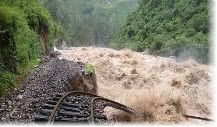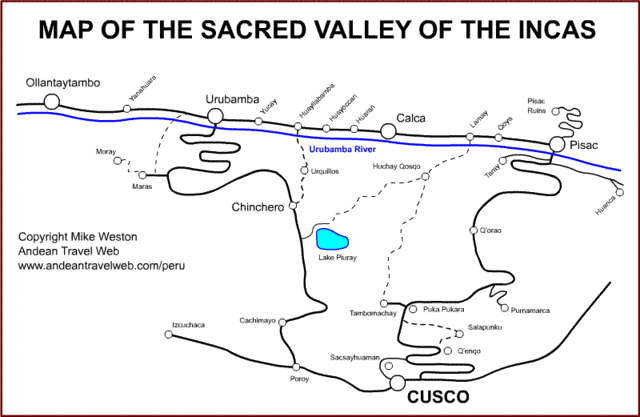( – promoted by buhdydharma )
This year’s rains have come to Peru. And the rains have been extremely heavy. The result has been a washout of crops in the Sacred Valley, which runs from Cusco to Machu Picchu, mudslides that have destroyed houses and other buildings, and flooding. Peru Rail’s tracks from Cusco to Aguascalientes have been washed out or buried under boulders. And the bridges across the Urubamba River at Pisac, Ollantaytambo, and Urubamba have all been washed out.
Tourists visiting Machu Picchu and staying in Aguascalientes, at the foot of the site, were stranded and rescued by helicopters. But the indigenous people of the area have not left, and they need assistance because many of their homes and their crops have been destroyed. What’s worse is that the rainy season is just beginning. If there is more torrential rain, and there may be, there will be even more destruction, more flooding, more landslides, more disruption of the infrastruture.
AFP reports:
Heavy flooding in southern Peru, which trapped thousands of tourists visiting the Inca city of Machu Picchu, has killed 20 and left at least five missing, Peru’s Civil Defense force said Saturday.
Thousands of others have been affected by heavy rains, the worst to hit the country in five years.
In the Cusco region, the downpours prompted landslides that trapped 3,500 visitors in and around the picturesque mountaintop tourist site of Machu Picchu.
Peruvian authorities used 12 helicopters and 40 pilots over four days to evacuate all the travelers trapped near the site, Latin America’s top tourist destination.
The evacuation of all visitors ended late Friday.
“The good news is that Machu Picchu, along with all the ancient sites, is intact,” said Carlos Millas, president of the chamber of commerce in Cusco, a region heavily dependent on the income from visiting tourists.
But the railway that ferries 90 percent of the 1,000 people that visit Machu Picchu each day to the site was damaged in the floods, and Peru Rail warned that repairs could take up to two months.
The rains are forecast to continue through Tuesday, with some heavy downpours predicted for the south, according to Peru’s weather service.
I have a strong spiritual connection to this area. I’ve written here about Andean Shamanism. And I’ve spent some time in the area. The indigenous people of Peru, including virtually all of their spiritual teachers and Shamans, by and large are poor and they depend upon agriculture to survive. Crops like corn and squash can be grown in the valley next to the Urubamba River because that is warm and there is ample water for irrigation. The irrigation technique is essentially the one used centuries ago by the Incas.
Those who live higher up in the mountains (the Sacred Apus) also depend upon agriculture. It is much colder in the mountains, many of which tower at higher than 17,000 feet. Potatoes grow at the top of the arable fields, other crops lower on the mountain. The fields are divided by the community so that the division will be fair and no one will get the best fields repeatedly. But when there are landslides and the soil is saturated as it is now, no crops can be grown, and those already in the ground may rot. And the fields are not accessible because of the mud. The animals kept by those in the mountains, llamas, sheep, and other animals need to be able to graze. Flooding makes that extremely difficult.
How to help out?
Make a donation to Doctors Without Borders. Also, the American Red Cross sends aid to Peru. My friends in the Shamanic World are trying to organize to fill gaps in the aid, especially to the most remote villages, but that is still a work in process.
—————–
simulposted at The Dream Antilles



11 comments
Skip to comment form
Author
be safe.
Thanks for reading
The American media just doesn’t report about these things.
else going on which could have caused it – farming methods, soil erosion, etc.
It was not widely reported that had the mangroves not been hacked down for purposes of building fancy hotels and freeing the coast for tourists – the tsunami a few years ago could have caused lesser damage.
In any event, I am sorry that a sacred place was affected.